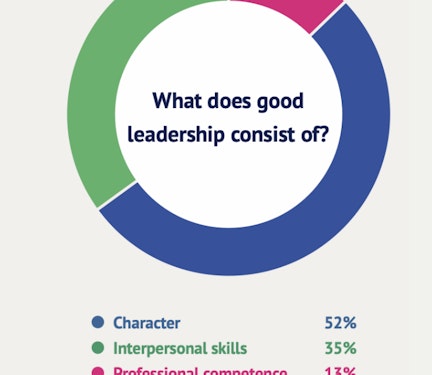Insight #1: character is seen as central to good leadership
Industry professionals in the UK see character as central to good leadership. They identified 84 features reflecting three dimensions of good leadership: 55% of features relate to character, 35% interpersonal skills, and 13% competence.

Why it matters
There is a gap between what practitioners see as central to good leadership in business and what is being valued and practised. Character is seen as central, yet it isn’t prioritised like competence is in leadership development programmes. Character falls under the umbrella of soft skills, which have gained momentum but still haven’t gained the same legitimacy as their hard skills counterpart – perhaps an issue perpetuated by what the name infers.
While competence has long been prioritised, research has shown that instead it is character that is central to stories of leadership failures and successes (Seijts et al., 2015). What is more, failing to prioritise character compromises the judgment required to support competencies and undermines the development of competence. Elevating character alongside competence has the potential to strengthen the behavioural muscles that support the judgment needed for good leadership.
So why isn’t character being prioritised? One reason may be that organisations don’t feel equipped to develop and embed character in organisational practices. Organisations are set up to prioritise competence, and change can be hard, especially when you don’t know how to change or lack a clear roadmap. There isn’t an abundance of subject matter expertise, and the tools that have been developed are often unknown to leaders.

What you can do
We want organisations to know that you can prioritise character alongside competence. Many organisations are already investing in character, and there are resources you can leverage.
- Invest in your own character development. By investing in your own character you begin to understand what it means, why it matters, and how it can be developed. Check out the seven strategies for character development to support your journey.
- Identify character champions in your team or organisation. This establishes character as a priority, enables the development of subject matter expertise, and character slowly becomes a modelled behaviour in leadership.
- Leverage the tools that have been designed to enable the embedding of character in your organisation. These include measurement instruments, development programmes, and strategic assessments, to name a few.
- Seek out guidance from organisations who have already taken the plunge. Learn what they did and what they would recommend from their experiences.
We encourage you to reflect on your team or organisation and consider how character is or is not being prioritised. Bring this reflection into action by raising this awareness in a discussion with a teammate or colleague this week.
Dr Corey Crossan is a Research and Teaching Fellow at the Oxford Character Project, where she develops and facilitates character development programmes for students, industry, and university partners. Her research examines how character can be developed and its impact on performance and well-being. Learn more here.
Anjali Sarker is a Programme Manager at the Oxford Character Project, where she is leading a wide range of programmes that promote value-based leadership among students and professionals. She has a background in international development and social innovation with a focus on leadership and human development. Learn more here.
